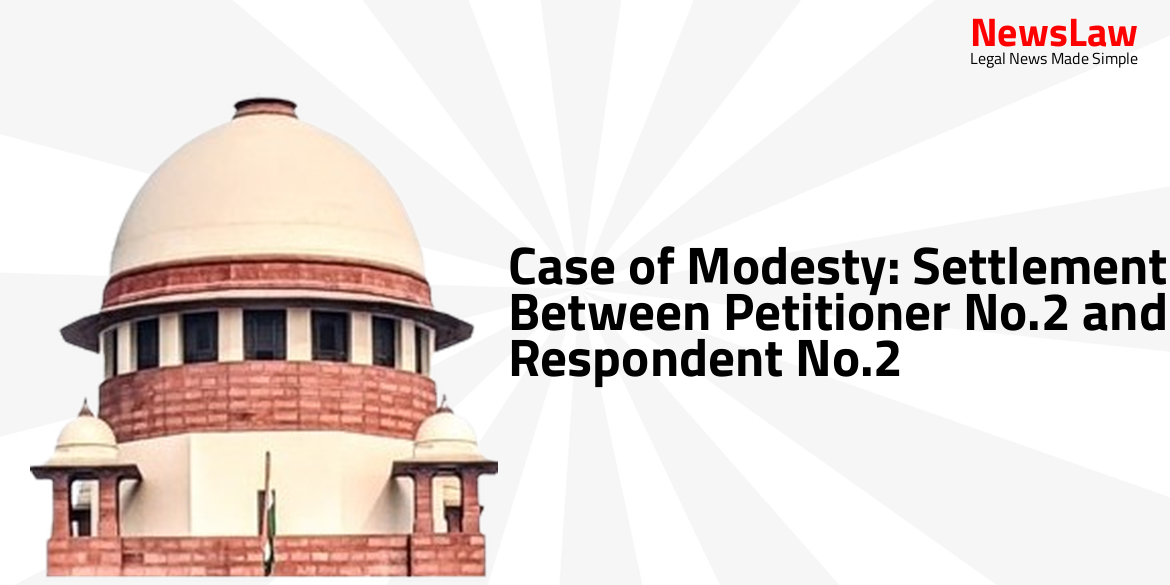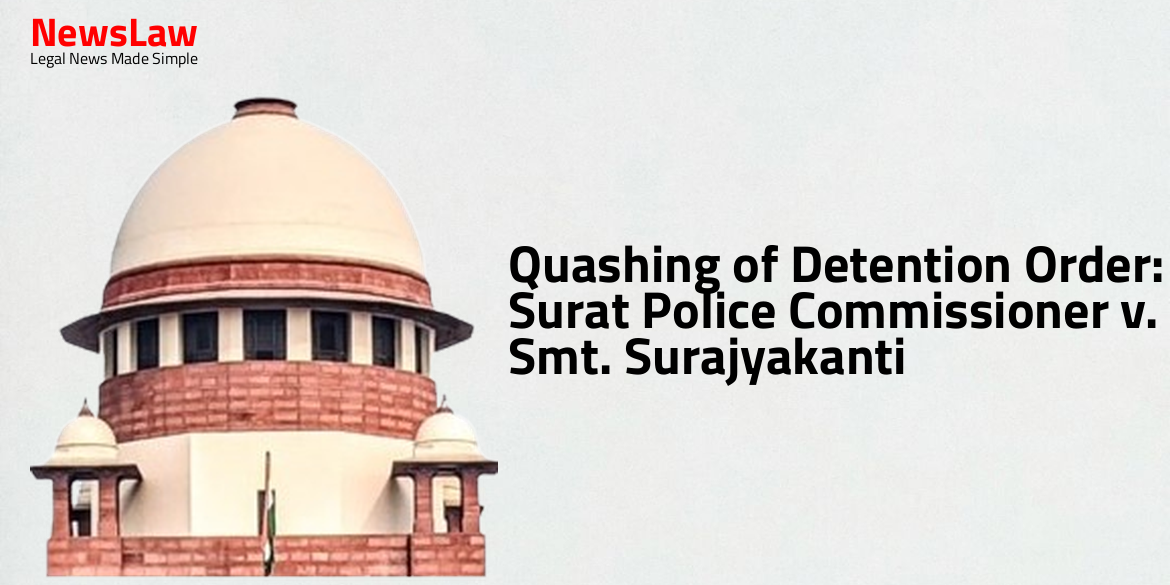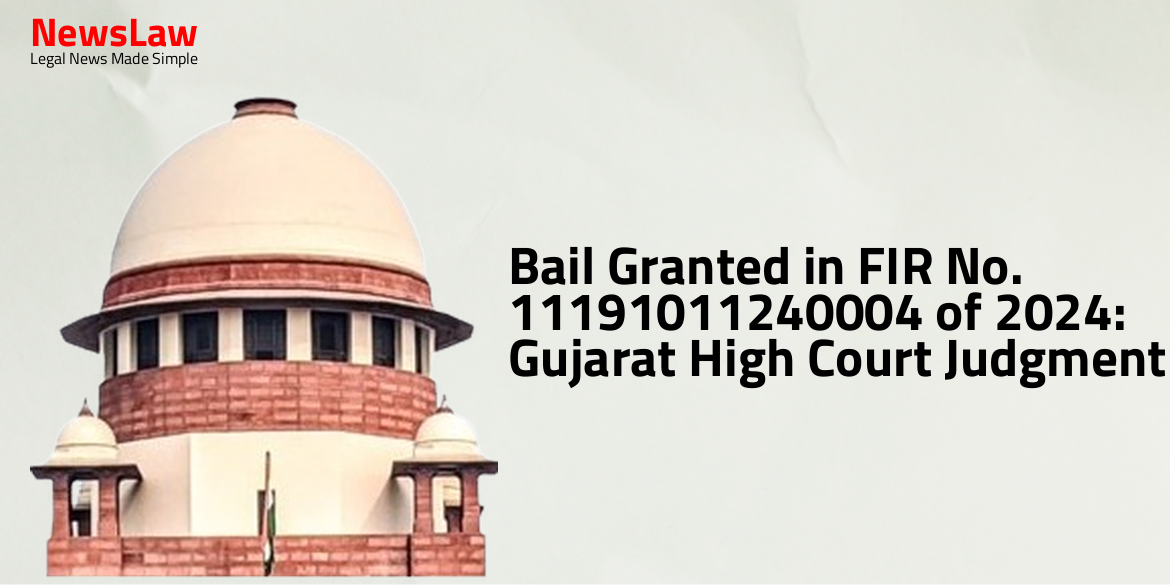In a significant legal development, the Gujarat High Court addressed a case involving the outrage of modesty and reprehensible conduct within a family. The settlement between petitioner No.2 and respondent No.2 has been a focal point of the proceedings, highlighting the complexities of the case. Read on to understand the implications of this judgment on societal norms and legal justice.
Facts
- Petitioner No.2 recorded nude videos of the respondent
- Forwarded videos to the respondent’s father-in-law
- Mother-in-law was aware of the situation
- Common intention among accused to commit the offense
- Two babies were born from the marriage
- Husband started recording intimate moments, objected by respondent
- Mother-in-law sided with son and husband
- Father-in-law allegedly molested respondent when she was alone
- Husband made respondent do unnatural things
- Marital family recorded nude videos to prevent hotel from being sold
- Father-in-law instigated husband to record and upload videos online
- FIR filed for various offenses under IPC and IT Act
Arguments
- The accused persons are family members of the victim, who is the wife of petitioner No.2.
- There is no medical evidence, symptoms, or proof of rape in this case.
- Considering the relationship between the accused and the victim, no offence under Section 376 of IPC is made out.
- The affidavit filed by the respondent – original complainant is requested to be considered.
- Settlement has taken place between the parties, and continuing the proceedings would serve no purpose.
- Quashing of the proceedings on the ground of settlement is sought by the petitioners.
- Respondent No.2 has settled the dispute with the petitioners and filed an affidavit of settlement.
- Respondent does not wish to prosecute the petitioners further.
- Offences are seen as serious as they are against society and involve non-compoundable allegations.
- Prima facie suggests the involvement of the accused.
- Request made to pass appropriate order based on settlement.
- Cited an unreported decision of the Hon’ble Supreme Court in a similar case for reference.
Analysis
- The charges against the accused, including the father-in-law and mother-in-law of the victim, are serious and not proved.
- The offences alleged are against the State and not just against an individual.
- The nature of the offences, such as capturing private moments, making them viral, and touching the victim inappropriately, is reprehensible.
- The victim’s fundamental and human rights have been violated, impacting her bodily integrity and dignity.
- The involvement of family members in the immoral sexual activity is highlighted.
- The Court emphasizes the seriousness of outraging a woman’s modesty, both physically and psychologically.
- Settlement between parties is not a ground for quashing the proceedings, especially for non-compoundable offences like those mentioned in the case.
- The High Court erred in delving too deeply into the allegations and evidence at this stage, as the charges need to be proven during the trial.
- There is a societal concern regarding the safety and security of women due to reported instances of sexual offences.
- The actions of the accused, such as capturing private moments and uploading them, are considered to be not only morally wrong but also criminal.
- The Court notes the need for a zero-tolerance approach towards sexual offences and emphasizes the significance of protecting women’s modesty and dignity.
- The Court’s analysis underscores the severe impact of the alleged crimes on the victim and society as a whole.
- Accused family members abused the victim using criminal force.
- They compelled the victim with full knowledge that her modesty would be outraged.
- Section 354C of IPC addresses capturing or disseminating private images and is applicable in this case.
- Accused father-in-law’s actions are covered under section 375(b) of IPC.
- Victim did not give free consent for disseminating her private moments.
- Offences alleged are socio-economic offenses that would adversely affect society and culture.
- Accused husband, father-in-law, and mother-in-law exhibited disgusting behavior towards their own wife and daughter-in-law.
- Section 375 of IPC defines rape involving various scenarios including lack of consent and manipulation.
- Explanation 1 and 2 provide further clarification on consent in sexual acts.
- The section also includes circumstances where consent cannot be communicated.
- The section outlines various scenarios where a man is said to commit rape against a woman.
- The court emphasized that the trustworthiness of statements must be decided when the witness stands in the witness box during trial and not during the exercise of jurisdiction under Section 482 of the CrPC.
- Referring to various judgments, the court highlighted the importance of ensuring the fundamental right to live with dignity, particularly for women.
- The court mentioned that even a woman can be tried for outraging the modesty of another woman under relevant sections of the IPC.
- Settlement of the case post filing of the charge-sheet does not provide grounds for considering a petition for quashing.
- Citing precedents, the court indicated that each criminal case should be evaluated based on its unique facts and circumstances, and resemblance to other cases is not determinative.
- The court observed that the power under Section 482 of the CrPC should be exercised cautiously, avoiding a ‘mini trial’ approach.
- Settlement between parties may be a factor, but the decision to quash criminal proceedings depends on the specific details of each case.
- The court highlighted that the exemption to marital rape is regressive and may contravene principles of equality.
- The term ‘modesty’ in the context of Section 509 of the IPC extends beyond sexual indecency to include any act that outrages a woman’s modesty.
- When parties settle and file a petition for quashing, the primary consideration should be the ends of justice and prevention of the abuse of judicial process.
- Witness turning hostile and settlement taking place is not a ground to allow the petition.
- Prosecution has the power to put leading questions to witnesses to corroborate evidence.
- Court should not conclude early that continuing with the proceedings would be futile if witnesses turn hostile.
- The petition is dismissed for lacking merit, but the trial court is directed to expedite the trial due to the petitioners being under-trial prisoners.
Case Title: BHAVINBHAI DEVSHANKARBHAI MODHA Vs. STATE OF GUJARAT
Case Number: R/CR.MA/8810/2024



